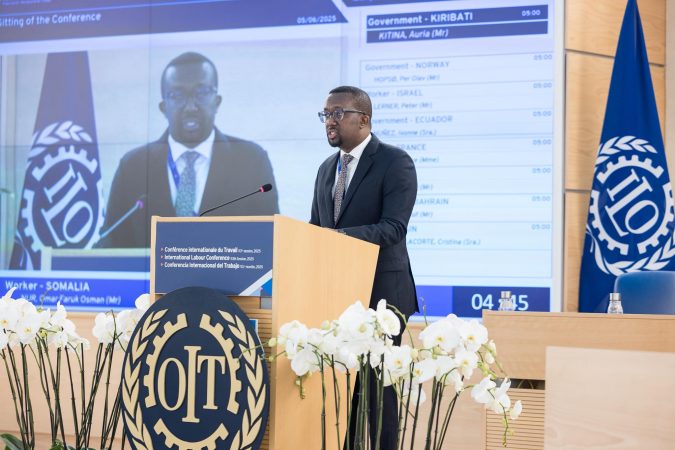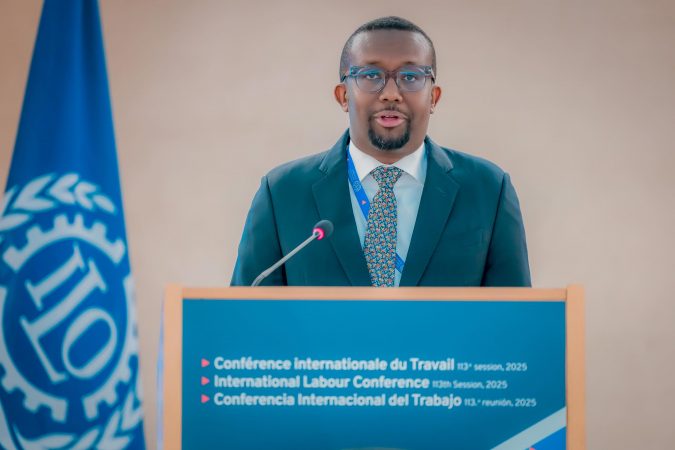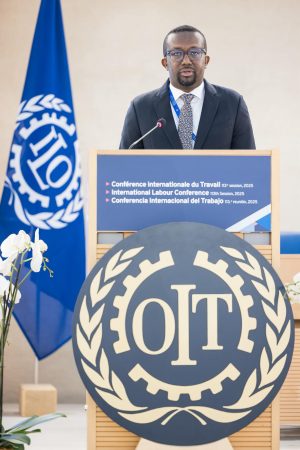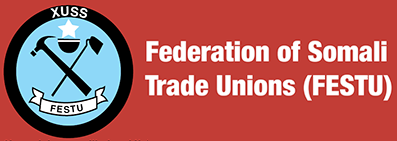Below is the transcript of the statement delivered by Mr Omar Faruk Osman, General Secretary of the Federation of Somali Trade Unions (FESTU), at the 113th Session of the International Labour Conference, along with the video link: https://live.ilo.org/event/plenary-debates-morning-sitting-2025-06-05?highlight=true
Address By Mr. Omar Faruk Osman Nur, General Secretary of the Federation of Somali Trade Unions (FESTU), at the 113th Session of the International Labour Conference in Geneva, Switzerland
Mr President,
Vice-Presidents,
Director-General,
Distinguished delegates
Allow me to begin by extending my warm congratulations to you, Mr President and to your vice presidents on your election. We wish you every success as you guide the important deliberations of this 113th session. I also take this opportunity to thank the Director-General for his comprehensive report, which provides a timely and sharp reflection on the current state and direction of the world of work.
The report gives voice to what many workers already know. The trust in the world of work is fractured. Rebuilding it will take more than high-level commitments. It requires a renewed social contract grounded in fairness, inclusion and dignity.
The report speaks of the many pressures converging on workers today. In Somalia, we are all too familiar with these pressures. Conflict, climate shocks, displacement, entrenched poverty and fragile institutions make daily life profoundly insecure for working people. These are not passing crises. These conditions have become our new normal and this situation itself constitutes a crisis.

One of the most urgent realities we face is the overwhelming dominance of the informal economy. In Somalia, informal work is not a growing trend. It has already overtaken the economy. More than 96 percent of our workers survive through unregulated, unprotected and often exploitative work. Most of them are women and young people, shut out from basic legal protections and invisible to enforcement systems. They are expected to carry the burden of the economy but receive none of the benefits of security or stability.
This cycle cannot be allowed to continue. Excluding informal workers from labour rights entrenches inequality and injustice. While the adoption of a revised Labour Code through social dialogue represents a significant milestone, we know that legislation alone will not change lives. Clearer enforcement, stronger institutions and a genuine commitment to turning legal protections into real outcomes are essential. That is why, just yesterday, we launched the first National Action Plan in this country to support the transition from the informal to the formal economy.
Meanwhile, a new layer of precarity is taking shape through platform-based work. In Somalia, this model is beginning to expand in transport, delivery and digital freelancing. These jobs are often promoted as flexible opportunities for young people. But for many, they come with low pay, no protections and no power to negotiate. They are not treated as workers, yet they are entirely dependent on these platforms for survival.
We must be clear. These are workers and they deserve the protections that come with that status. The digital economy must not be a loophole that allows the exploitation of labour to flourish behind technology. We support global efforts to bring platform work under the full protection of international labour standards.
Across many sectors in Somalia, the risk to workers’ health and safety is immediate and constant. In agriculture, healthcare, waste collection and informal processing, exposure to biological hazards is a daily reality. Most workplaces lack even the most basic safety provisions. There are no functioning national systems to monitor or respond to occupational health threats and workers are often unaware of the dangers they face.

Occupational safety is not a privilege that belongs to certain countries. It is a fundamental right. The ILO has a vital role to play in supporting countries like Somalia to develop and implement national systems that protect workers’ health and well-being as part of the broader decent work agenda.
Somalia is also a country of origin, transit and destination for thousands of migrant workers. Many leave home in search of employment abroad, driven by poverty and limited opportunities. Yet far too often, what they encounter is abuse, humiliation and exploitation. Somali migrant workers continue to endure appalling violations, frequently with no access to justice or redress. Some return home with nothing. Others never return at all.
We strongly support the campaign led by the ITUC and ITUC-Africa to protect African migrant workers. At this conference, meaningful steps have been taken under this initiative to press for accountability, protection and genuine reforms. We are proud to be part of this effort and urge more decisive action to dismantle the systems that allow such abuses to continue.

Through all of this, we remain firmly committed to building a better future. This year, after years of struggle and engagement, we advanced a modern Labour Code and began integrating just transition into Somalia’s development planning. These are not symbolic gains. They are real progress towards dignity and justice for Somali workers.
But our journey is far from over. Somalia needs continued support from the ILO, the international community and trade unions around the world. Our challenges are many, but we know that solidarity and partnership make the difference between surviving and advancing.
We do not come here seeking sympathy. We come as a partner in progress, committed to our shared mission of advancing decent work, justice and dignity for all workers. Somali workers are part of the global labour movement and their rights are just as important as those of any other worker. We believe that with continued collaboration, complementarity and support, we can make meaningful progress and ensure that no worker is left behind.
I thank you.
